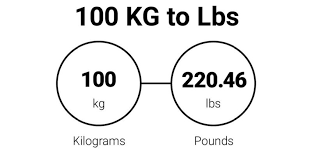100kg to lb

In the realm of weights and measures, understanding conversions between different units is crucial. One common conversion that often comes up in daily life, especially when discussing body weight or certain measurements, is between kilograms (kg) and pounds (lb). Let’s delve into this conversion and explore how 100 kilograms translate into pounds.
Kilograms and Pounds: What Are They?
Before diving into the conversion, let’s grasp the basics. Kilograms and pounds are units of mass commonly used around the world, albeit in different regions.
- Kilogram (kg): This is the standard unit of mass in the metric system, widely adopted for its simplicity in scientific and everyday use. It is the base unit within the International System of Units (SI) for mass.
- Pound (lb): In contrast, the pound is a unit of mass used in the imperial system and the United States customary units. It’s worth noting that while the metric system has gained global prominence, the pound remains prevalent in certain countries and contexts.
The Conversion Formula
To convert kilograms to pounds, a simple mathematical formula is applied:
Pounds=Kilograms×2.20462
This conversion factor, 2.20462, is the approximate equivalent of one kilogram in pounds. Therefore, by multiplying the number of kilograms by this conversion factor, we obtain the corresponding weight in pounds.
100 Kilograms to Pounds
Now, let’s specifically examine the conversion of 100 kilograms into pounds using the formula:
Pounds=100 kg×2.20462=220.462 lb
Hence, 100 kilograms is approximately equivalent to 220.462 pounds. This showcases the notable difference in values between kilograms and pounds.
Practical Implications
Understanding this conversion has practical implications, especially in scenarios where there is a need to interchange units or comprehend weights stated in different systems. For instance:
Health and Fitness
In the realm of health and fitness, body weight is often discussed in both kilograms and pounds. Individuals may track their weight loss or gain goals using one or both units. For someone weighing 100 kilograms, their weight in pounds would be approximately 220 pounds. This knowledge can assist in setting fitness goals, understanding dietary recommendations, and monitoring progress.
Travel and International Trade
In travel, luggage weight limits are often specified in pounds or kilograms, depending on the country or airline. Being able to convert between these units is valuable to ensure compliance with baggage restrictions. Moreover, in international trade, where different countries may use distinct measurement systems, conversions between kilograms and pounds are vital for accurate transactions and logistics.
Everyday Conversations
Conversing with individuals who are accustomed to different measurement systems might necessitate the ability to convert between kilograms and pounds. Whether discussing a person’s weight, food portions, or any other measurable quantity, this conversion skill proves beneficial in effective communication.
Conclusion
The conversion between kilograms and pounds, though simple in concept, holds significance in various aspects of daily life, from health and fitness to travel and trade. With the formula and understanding of the equivalence between these units, individuals can seamlessly navigate between metric and imperial systems of measurement.





